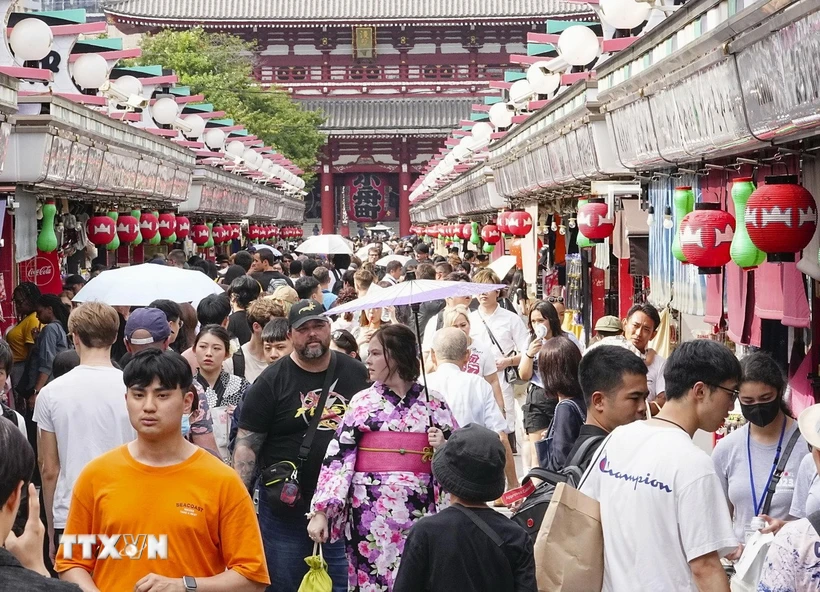Ryuichi Ueki, a restaurant owner in Tokyo, only accepts cash, refusing any customers who swipe their credit cards or use payment apps.
Like many small business owners, Ueki, the owner of Asahi noodle shop in Asakusa, an old part of Tokyo, didn't want to pay credit card fees or take the time to get to grips with digital payment platforms like Apple Pay or LINE Pay .
"Some customers come to eat and want to pay by credit card, saying they don't have cash. At times like that, I will ask them to go to the ATM near the restaurant to withdraw money," said Ueki, who inherited the restaurant that opened in 1914.

Ryuichi Ueki in front of his 1914 noodle shop in Tokyo. Photo: Al Jazeera
Despite the popularity of cashless payments today, Ueki doesn't want to change.
“It’s not necessary, because I feel comfortable with what I have,” he said, explaining that things still operate the way his family’s noodle shop has been run “since the old days.” “It seems strange, but I never thought about changing.”
Ueki’s thinking is common in Japan. According to data from the Ministry of Economy, Trade and Industry, non-cash payments in Japan have more than doubled over the past decade, reaching 36% in 2022, but still lag far behind developed countries in the region such as South Korea or Singapore, where the majority of people do not use cash.
Japan's cash culture is one of many examples of the East Asian nation's stagnation in the digital economy. Japan is a world leader in high-tech fields like robotics, but in many other ways the world's third-largest economy remains stuck in the past.
Many Japanese government services are still not available online, forcing people to fill out paperwork manually or visit local government offices in person. Many offices still use fax machines instead of email, while physical “hanko” stamps are preferred to electronic signatures.
Japan's Digital Transformation Agency, which is responsible for leading the country's digital transformation, estimates that 1,900 inter-agency procedures still rely on old-fashioned storage technologies such as CDs and even floppy disks.
During the Covid-19 period, a local official in Yamaguchi sent floppy disks containing residents’ data to a local bank to transfer relief funds. A mistake in the process resulted in one resident being mistakenly transferred 46.3 million yen ($331,000).
In the latest world digital competitiveness rankings released by the Management Development Institute, Japan ranked 29th out of 63 economies, behind Singapore, South Korea, Hong Kong, Taiwan and mainland China.
Japan's reliance on outdated systems is partly due to its successful use of such technologies to become world-class, said Martin Schulz, chief policy economist at information technology company Fujitsu.
“When the train system uses mechanical clocks to keep time, replacing them with digital clocks is entirely feasible, but it would incur huge conversion costs without bringing any significant additional benefits,” said Schulz, who is also an advisor to the Japanese government.
Japan’s government has long recognized the need to address the country’s lagging digital transformation, which threatens to undermine efforts to boost productivity and revive its $4.9 trillion economy.
In a 2018 report, the Ministry of Economy, Trade and Industry warned that Japan is facing a “digital cliff,” a situation where businesses that do not adopt digital systems risk losing $86.1 billion a year after 2025.
Japanese Prime Minister Fumio Kishida has pledged to accelerate the digital transformation, spending $42 billion to improve digital infrastructure in areas where labor shortages due to an aging population are becoming more pronounced.
He also appointed Taro Kono as minister in charge of digital transformation, who declared war on floppy disks and once quipped about his fax machine being prone to paper jams, despite Japan being a "far more advanced society".

Taro Kono, Japan's minister in charge of digital transformation. Photo: Reuters
For Japan, the Covid-19 pandemic has been a wake-up call. While many other countries saw the pandemic as an opportunity to explore new forms of business through online platforms, Japan found itself “just laying the foundations” for the digital age, according to Schulz.
“People used to prefer face-to-face meetings, but that changed during the pandemic with the mindset shift of, ‘Oh, we know we’re a bit behind the curve, but now we’re going to leapfrog digital, so there’s going to be a huge benefit and the game is going to change,’” Schulz said.
But Japan’s aging society suggests the country’s digital transformation could be an uphill battle. After years of low birth rates, the Japanese government expects a shortage of 450,000 workers in the information and communications technology sector by 2030.
Japan’s bureaucratic rigidity is also slowing the process. In an article marking the first anniversary of the Digital Transformation Agency last year, the Yomiuri Shimbun said the agency’s work had been “stalled” due to a lack of cooperation from other agencies. The uncooperative parties included the Justice Ministry and local governments, which opposed the plan to adopt a cloud-based management system by 2025.
Ueki, a noodle restaurant owner in Tokyo, says many Japanese are torn between maintaining the status quo or striving for change.
"Because we were taught in school to follow rules, I guess we still have the mentality that we shouldn't do anything that might go wrong," Ueki said.
"I consider myself lucky to have this attitude," he added. "I feel good about the current business situation and my daily life, very comfortable."
Hong Hanh (According to Al Jazeera )
Source link
































![[Photo] "Beauties" participate in the parade rehearsal at Bien Hoa airport](https://vstatic.vietnam.vn/vietnam/resource/IMAGE/2025/4/11/155502af3384431e918de0e2e585d13a)































































Comment (0)